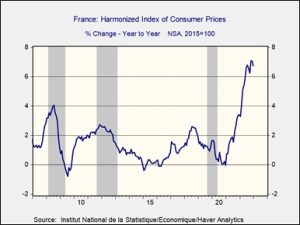Daily Comment (January 4, 2023)
by Patrick Fearon-Hernandez, CFA, and Thomas Wash
[Posted: 9:30 AM EST] | PDF
Our Comment today opens with some positive news from Europe, where year-over-year price inflation looks like it may be moderating. The news has raised hopes of lower inflation and interest rates even beyond Europe, giving a boost to the stock and bond markets as well. We next review a wide range of other international and U.S. developments with the potential to affect the financial markets today, including the latest on the Russia-Ukraine war and an update on the historic challenges that the U.S. House of Representatives is having in selecting a new Speaker.
France: The December Consumer Price Index (CPI) was up just 6.7% in the year ending in December, coming in cooler than expected and marking a slight improvement from the annual gains of 7.1% in each of the previous two months. Much of the slowdown in inflation reflected falling energy prices—the result of both warm weather across the Northern Hemisphere that has helped bring down global natural gas prices and government efforts to cap prices.
- Excluding energy and unprocessed food, the December core CPI accelerated to an annual rise of 5.3%, compared with a rise of 5.0% in the year to November.
- Despite the acceleration in core inflation, the decline in the headline number has sparked optimism about slowing inflation and lower interest rates throughout Europe and beyond. In turn, that has buoyed stock and bond prices in multiple markets so far this morning.

United Kingdom: Because of Europe’s recent warm weather and reduced global prices for natural gas, analysts now believe British household energy bills in 2023 will be lower than previously anticipated, dropping below the level of the government’s price guarantee in the second half of the year. The resulting fall in the cost of living would not only be politically positive for the government, but it would also limit the fiscal cost of its programs to shield households from high inflation.
Russia-Ukraine War: As heavy fighting continues along the front lines and Russia keeps launching air strikes against Ukraine’s infrastructure, Russian oligarch Yevgeny Prigozhin has admitted that his Wagner Group mercenaries have stalled in their effort to seize control of the eastern Ukrainian city of Bakhmut. Other reporting suggests that Russian forces have shifted their focus to the smaller city of Soledar, just to the north of Bakhmut. In any case, Prigozhin’s admission may be laying the groundwork for further criticism of the Russian Ministry of Defense, which Prigozhin is using to implicitly establish himself as a more effective leader who is ready to take power.
European Union-China: With COVID-19 cases continuing to rip across China following the sudden end of the government’s Zero-COVID policies, the European Union today is expected to finalize a requirement that Chinese travelers must test negative for the disease before boarding flights to the EU. The move would come as France, Spain, and Italy have already imposed such testing rules, but a bloc-wide requirement would further embarrass and anger Beijing and feed into the global fracturing that we so often write about.
U.S. Congress: Yesterday’s voting for the new Speaker of the House proved to be inconclusive, after Republican Kevin McCarthy failed to secure a majority even after three rounds of voting. It was the first time the House hasn’t been able to select a Speaker on the first ballot since 1923. The voting will continue today.
- The conservatives’ disciplined opposition to McCarthy may be a good example of the “vetocracy” engendered by polarized politics and strong interest groups, as described by Sarah Quinn in her book American Bonds.
- McCarthy has vowed to take as many votes as necessary to win the position, aiming to wear down his right-wing opposition, so it is not clear when the balloting will be complete and when a new Speaker will be selected.
U.S. Labor Market: Workers at videogame firm ZeniMax, a unit of Microsoft (MSFT, $239.58), have voted to form a union, marking the latest example of labor organization within the largely non-union information technology industry. The vote illustrates how today’s labor shortages have shifted economic power towards workers and away from managers and owners.
U.S. Weather: Beginning today, the West Coast will be facing its third major rain and snow storm since Christmas. The National Weather Service has already warned of flooding, especially in northern California, which implies the risk of meaningful economic disruptions, although the storms could potentially help end California’s recent drought.


